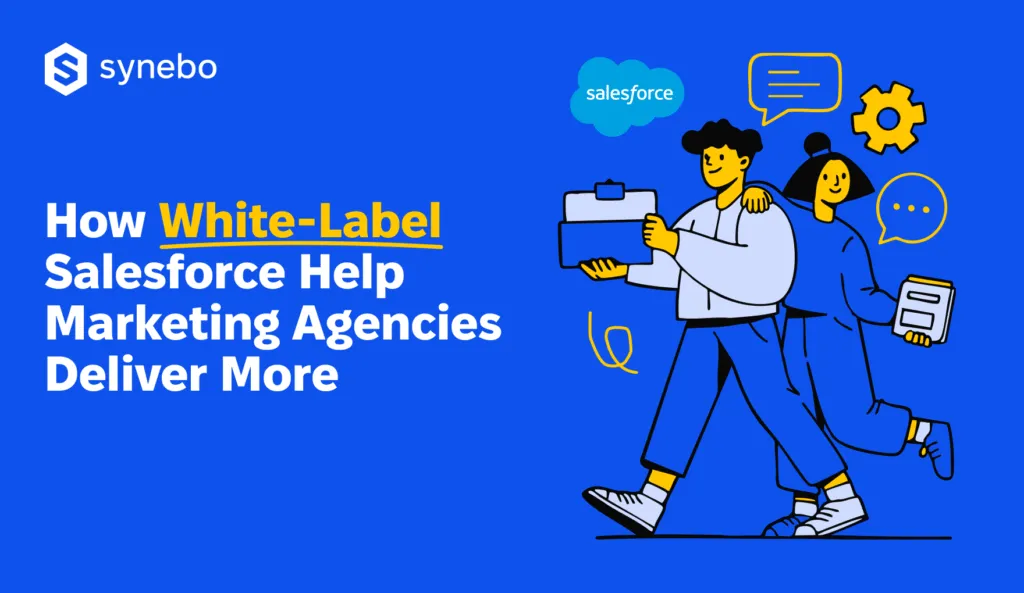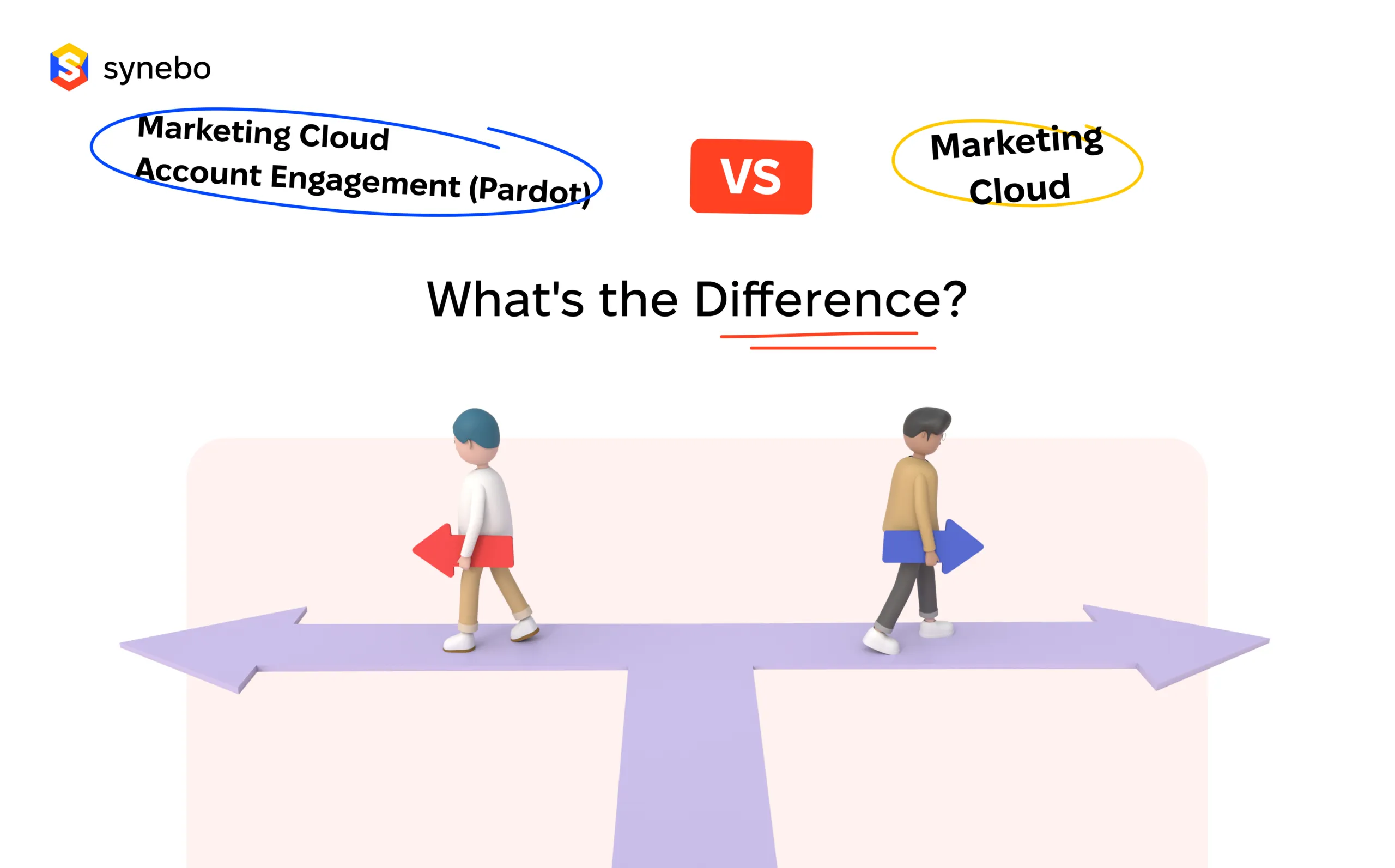White-Label Salesforce vs Referral Partnerships: Which Is Best for Agencies?
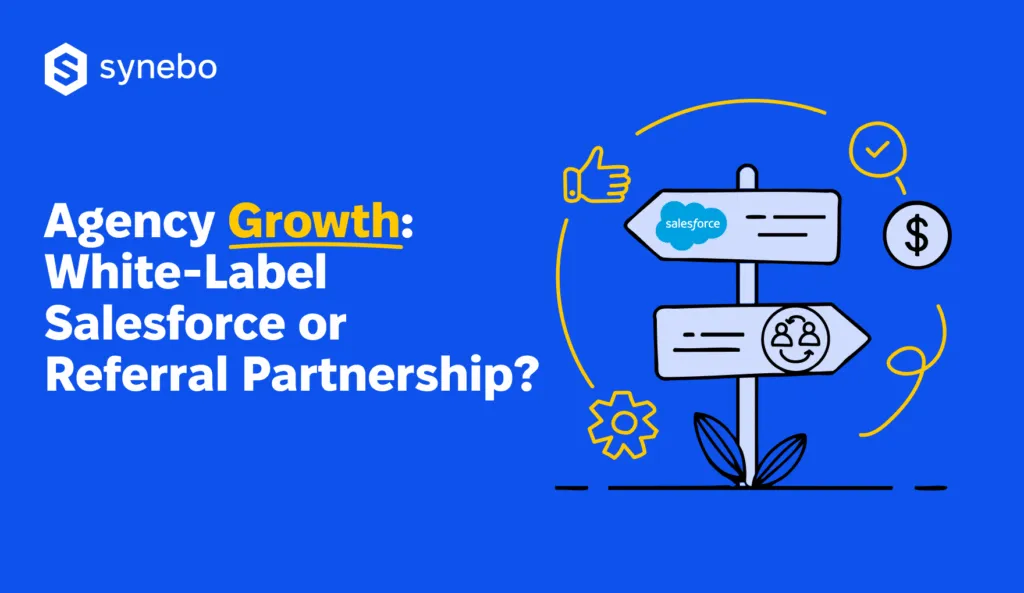
The Salesforce services market is expanding at full speed. And as a marketing agency ready to scale, you’re likely standing at a crossroads: should you deliver Salesforce solutions under your own banner through a white-label model? Оr hand clients to trusted experts? It’s a meaningful choice – your white-label vs. referral decision can define how you grow, earn, build your brand, and win your client trust.
Client expectations keep rising, and competition grows sharper. Agencies now have the challenge: they want to capture the new demand while keeping control over quality, delivery, and brand voice. Follow the wrong route, and your profits can fade or your relationships strain. But choosing between white-label and referral partnerships wisely gains you a stable way to expand – alongside extra revenue.
That’s why revisiting how you engage with Salesforce partnerships isn’t a side note. It’s a strategic decision that shapes your agency’s next stage of growth.
So, let’s scrutinize the real differences between white-label vs. referral partnerships, compare how the white-label model and the referral model operate, and see which route gives you more control, profit, and stability.
Why Agencies Are Turning to Salesforce Services
Our customers in digital marketing, consulting, and integrated agencies say: their clients increasingly ask for Salesforce expertise. Today, businesses really crave sharper CRM systems, better-working automation, and progress they can “feel and touch”.
For agencies, this won’t be a passing trend. The Salesforce implementation services are now and will stay an opening to deliver greater value, broaden income streams, and strengthen their client loyalty.
However, a familiar challenge surfaces. The majority of marketing agencies lack the tech capacity or certified Salesforce professionals to build SF solutions internally. Recruiting (and/or training) a dedicated team is slow and expensive. Especially when client demand grows more quickly than internal capabilities.
That’s why, today, 2 paths have gained traction:
- White-Label Salesforce Services. It’s partnering with an SF proficient company that delivers under your brand. The model allows you to preserve full ownership of the CX and expands your offering.
- Referral Partnerships. It’s introducing clients to a Salesforce services provider and earning a commission. The approach lowers your operational strain and still meets your clients’ needs in SF services.
Either option promises you growth. Yet, each is different in how your agency manages control, revenue, and your reputation. When you understand where to stand between the two, it helps you make a crucial strategic choice.
What Is a White-Label Partner Model?
We’ve already covered this partnership type in detail in a separate article. Let’s hit the main takeaways.
Read More: How White-Label Salesforce Services Help Marketing Agencies Deliver More
So, what are white label solutions? Overall, in this cooperation model, an external Salesforce-certified consulting partner delivers the full service behind the curtain. Your agency remains the visible face to the client. Everything – proposals, communication, reporting – has your agency’s name. This preserves your identity and control over your client relationship.
The external team fully handles tech delivery, config, and support. It also ensures the project goes smoothly. In this model, you, as a marketing agency, focus your work on creative direction, strategies, and client trust – actually, your usual interaction with your clients. Plus, on the whole SF project oversight and some logistics.
When managed skillfully, a white-label partnership yields high margins (higher than, say, referral models) because you oversee pricing and client engagement. It also builds deeper client loyalty: the client perceives expertise under one – your – brand, not multiple providers.
In which cases does white-label Salesforce support prove its true worth?
- When an agency is seeking to enter the CRM (Salesforce) services market rapidly, and has no time for recruiting/training its in-house team.
- When an agency wishes to expand their service portfolio and simultaneously protect brand consistency and quality of delivery.
- When an established consultancy or full-service firm aims to scale SF capacity during growth phases (and/or peak demand).
These are just the typical scenarios. Yet, our experience shows that this approach can fit almost anywhere – as long as you choose a proficient white-label partner.
Looking for a trusted team to power your white-label consulting services? Reach out to Synebo – we’d be delighted to support your Salesforce projects under your agency’s name.
What Is a Referral Partnership Model?
White-label and referral partnerships differ. The latter centers on collaboration in its open form. Under this model, you introduce your client to the Salesforce consulting partner you trust, who takes full responsibility for delivery.
You earn your referral fee or commission for the introduction and may stay engaged in a light oversight or relationship management role. But the technical execution goes entirely to the SF specialists.
What’s good: this model removes many burdens from you, such as managing delivery, recruiting SF experts, and overall handling project logistics.
At the same time, since the delivery partner becomes the primary executor, your control over service quality and communication is significantly reduced. Your margins tend to be smaller if you compare them to the white-label services. Yet, your risks are also lower – no direct project accountability, staffing costs, and more (we’ll explore this all in depth further in this overview).
So far, how does referral partnership break away from the white-label approach?
- Lower Оperational Load. You’ve got no project management, and there is no tech oversight required.
- Reduced Exposure. You carry minimal financial and delivery risk.
- Limited Brand Іnfluence. The Salesforce consulting and development company works under its own name, not yours.
- Smaller Profit Share. Your earnings come as commissions, not full-service revenue.
Referral partnerships suit agencies that:
- Prefer to avoid building an SF delivery arm, yet want to address their client demand.
- Wish to maintain client relationships and let specialists handle the execution.
- Seek an (almost) risk-free entry point to Salesforce before scaling deeper.
When comparing white-label partnerships and referral partnerships, the latter model offers you a more comfortable balance between opportunity and simplicity. We’d say it’s a practical route for agencies that are keen to participate in Salesforce projects without restructuring their business model.
White-Label vs. Referral: Pros & Cons of Two Models
By now, you’ve probably noticed that both models give you a way to meet your client demand without the hassle of building an in-house SF team. Yet, – and we have already outlined it a bit, too – they sit on different ends of the control-risk-revenue spectrum.
Understanding both models’ strengths and weaknesses helps you choose a strategy that best supports your ambitions and “appetite” for responsibility.
Let’s first look at why you should invest in white-label solutions – what makes their strengths so hard to overlook. After that, we’ll cover the cons of this model.
Аnd then apply the same lens to the Referral model.
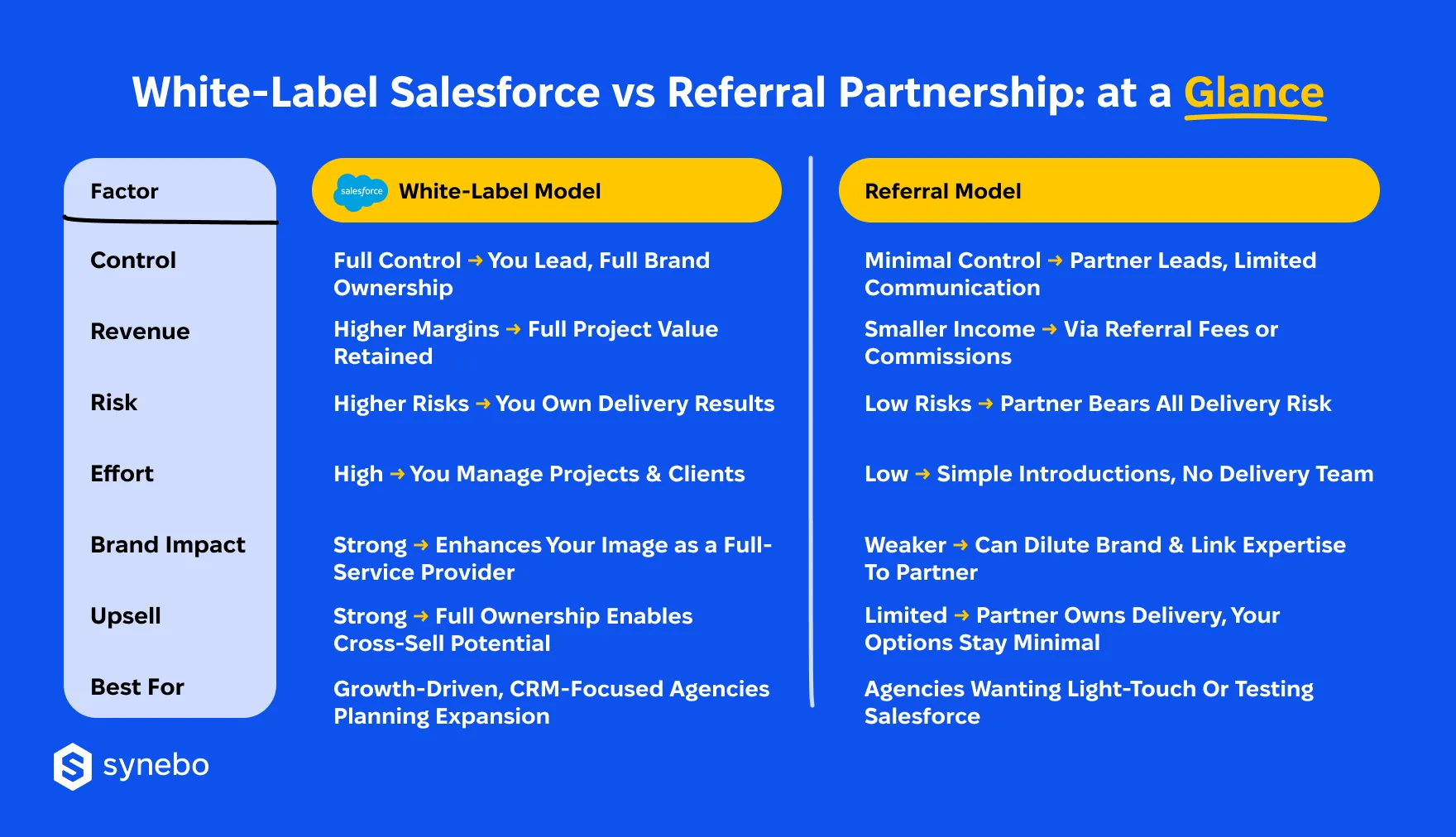
White-Label Salesforce Model
Pros
- Own Expertise & Recognition. Your agency appears as the expert in a fast-growing niche. You expand your brand’s authority and enhance your reputation. It doesn’t just come at no cost – it, on the contrary, brings you profit.
- Set the Price. With full ownership of delivery, you decide how to price your services and keep the margin that reflects your value (not someone else’s commission rules).
- Cross-Selling Рotential. You can extend your client relationship with add-on modules, integrations, or ongoing support agreements. White-label solutions for digital agencies usually increase their sustained revenue.
- Broader Market Reach. When you act as a full-service provider, it opens doors to bigger contracts and partnerships. You’re no longer limited to the marketing services; you shape business solutions.
Cons
- Reputation on the Line. The work quality of your white-label Salesforce partner becomes your responsibility. Any misstep they make reflects on the reputation of your brand – directly.
- Supervision Effort. Your success requires a thorough partner selection process. Then – clear governance and project supervision.
- Management Load. Your team must handle project management, client communication, service-level agreements, and post-delivery care.
- Cash Crunch Moments. In some white-label Salesforce consulting contracts, agencies pay partners before receiving full client payments (flexible billing terms can help mitigate this point, though).
Referral Partnership Model
Pros
- Minimum Еffort. You introduce the client to a Salesforce services provider, and they execute the project. You don’t have to spare delivery resources, set up processes, and maintain support teams.
- Lower Liability. Your Salesforce implementation partner assumes the technical and contractual risk. You stay clear of any project complications or warranty obligations.
- Expansion Without Stretching. This advantage naturally flows from the two above: you stay in your zone of expertise – strategy, marketing, promo, and creative delivery, and your operations stay just as lean. Yet, your clients see more value in working with you.
- Passive, Effort-Free Earnings. Every effective referral brings you fee-based income, what’s important – without adding workload to your team. It’s a breezy way to keep revenue flowing while preserving your core expertise.
Cons
- Lower Profit Potential. Revenue comes to you through referral fees or commissions, as we’ve mentioned. The latter are always smaller than white-label Salesforce development & consulting margins.
- Control Trade-Off. Your delivery partner manages execution. But not only. They also manage communication – under their brand. Your influence over quality and timing can be minimal.
- Fading Brand Presence. Because your clients associate SF expertise with your partner instead of your agency, your position as a strategic leader may weaken.
- Lost Add-On Potential. Because your Salesforce services provider owns the delivery relationship, it limits your ability to propose complementary services or ongoing support.
Overall, we’d like to point out that in the white-label vs. referral equation, there’s no winner. And the choice isn’t about “good” or “bad” – it’s about fit. Either option gives more value to your clients and less effort – to you.
The difference is in who “carries the flag” and how closely you want your name to be tied to the delivery.
Let’s now figure out which path makes the most sense for your agency and what factors should guide your choice.
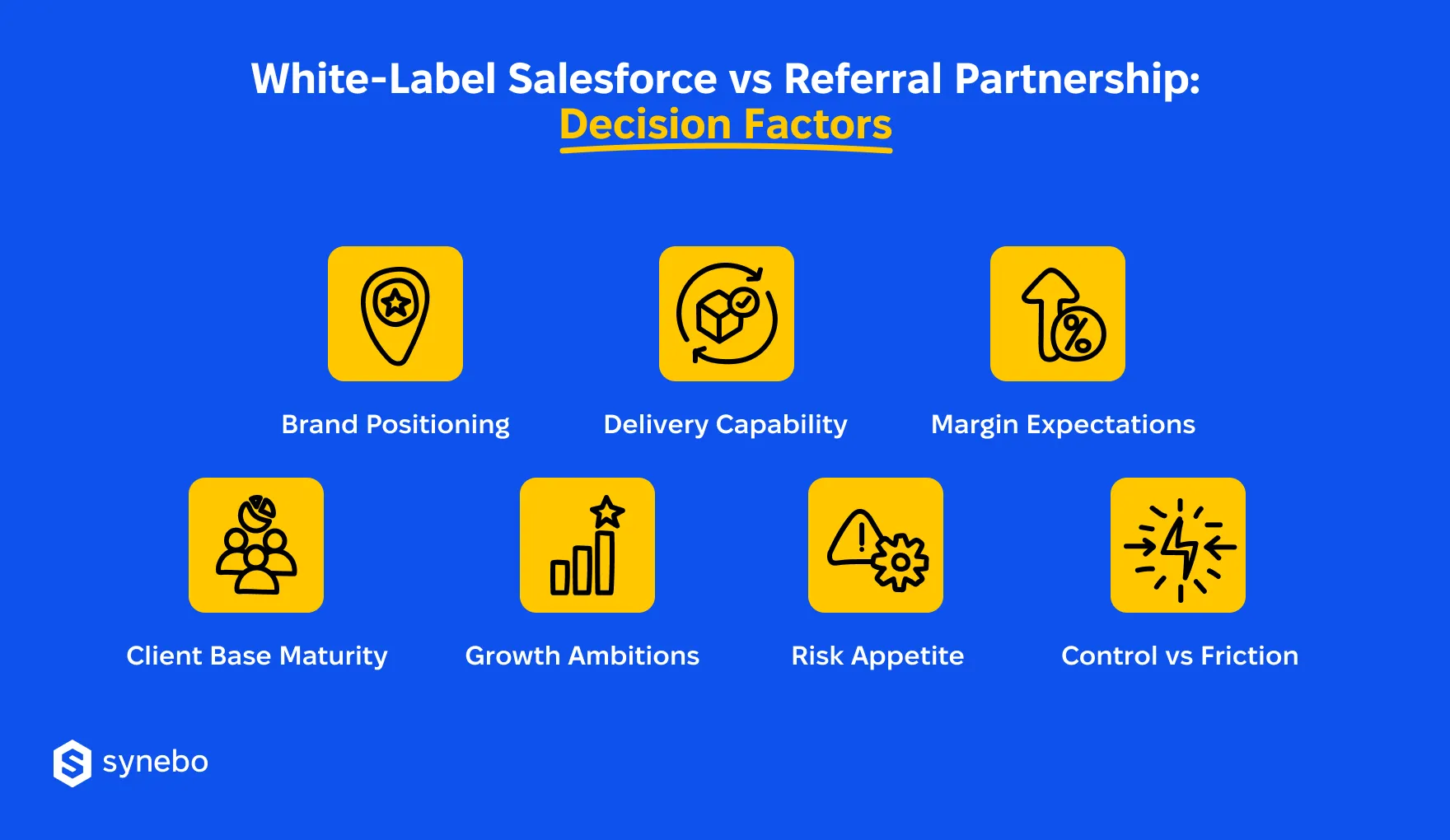
Your Key Decision Points
So, white-label or referral partnership? What option suits your agency? To make this decision easier for you, we recommend thinking about how your agency wants to grow and what level of control feels оkay for you.
Consider:
- Your Brand Role. Do you want to present yourself as a Salesforce consulting partner for your clients – or stay the connector who makes expert partnerships happen?
- Operational Muscle. Can your current structure handle SF projects operationally?
- Profit Philosophy. Would you rather aim for higher margins and full ownership – or go for simpler, commission-based revenue that scales with less stress?
- Client Base Мaturity. How much Salesforce expertise do your clients expect directly from you?
- Growth Horizon. Do you consider SF a side stream to complement your core business, or the next chapter in your long-term service portfolio?
- Risk Comfort Zone. How comfortable are you with delivery accountability, cash-flow exposure, and partner dependence?
- Control-Ease Balance. More control means deeper involvement (and more moving parts). Less control keeps things light – but also out of your hands. What feels right for you?
Our experience shows that when agencies are considering the white-label vs. referral opportunities, they don’t take a business decision. In fact, they make a choice of how they show up for clients. One model lets you fully craft the experience, the other lets you stay behind the scenes.
Need expert guidance from a reputable Salesforce consulting and development company to choose the right partnership model? Connect with Synebo – we’ll help you find the balance between control, growth, and scalability.
White-Label vs. Referral: When to Choose Which Model
So, as you could already see, selecting between the white-label solutions delivery and a referral рartnership is not about “which is better”. Each model suits a different level of maturity and ambition, and for many agencies, the ideal answer evolves over time.
You might have already reflected on the questions above. In this section, we’ll take a closer look at when each model deserves your focus.
When the White-Label Model Makes Sense
You’re positioned to succeed with this model if you:
- Have strong project management processes. Your team knows how to coordinate complex, multi-phase projects and keep clients informed without confusion.
- Already collaborate with a proven white-label solutions provider. Or – possibly – you have already employed an SF specialist(s) who can deliver quality under your banner.
- Aim to strengthen your service portfolio. And at the same time, you want to present a unified brand that handles both strategy and technical execution.
- Seek higher margins. And direct control over pricing, delivery pace, and client communication is important to you.
Based on our experience, we can only confirm: services offered under white-label allow you to evolve into a full-service player. But it requires confidence in both operations and partner oversight (project management).
When a Referral Partnership Is Better Fit
It’s often the right call when you:
- Lack in-house certified Salesforce experts. Or prefer not to invest in training and recruitment.
- Want to understand SF opportunities. After you try, you may think about committing to a white-label delivery structure.
- Value simplicity and low risk at this very stage of your business. They are now more important to you than control and margin.
- Prioritize client trust and quality assurance, but you’re not ready to manage the delivery yourself. So, to keep your clients happy, you prefer to rely on reliable Salesforce development experts.
Our clients compare this model to a “low-friction gateway”. They still respond to their client demand but don’t overextend their internal resources.
Hybrid and Transitional Path
Many agencies start with the referral model to test market appetite. After they make sure there is a steady demand for SF solutions and the partner performance is reliable, they move to white-label collaboration. Such progression offers flexibility: you don’t jump in fully into the unknown. You scale your Salesforce involvement step by step.
To assess your readiness for the white-label vs. referral shift, track a few metrics:
- Client Satisfaction. Are referred clients happy with outcomes and communication flow?
- Bottom-Line Lift. Would managing delivery directly lead to profit growth that is worth your attention?
- Сost of Delivery and Оversight Load. This metric ties back to one of the questions mentioned earlier: сan your team handle project coordination effectively?
- Brand Risk. How much exposure are you comfortable with if something goes off track?
By the way, your “right” white-label vs. referral choice isn’t static. Because all agencies evolve, and so do their partnerships. What we’d say here is that the best model is the one that matches your current capacity, plus supports where you want your agency to go next.
Choosing the Path That Fits Your Agency’s Ambition
So, if and when you decide to deliver Salesforce services, white-label or through referrals, your key is knowing what type of partnership supports your growth, brand promise, and client relationships.
One model may work at a certain stage of your marketing agency’s development, and another may make more sense later.
In our experience, we’ve noticed just one crucial thing: the best “white-label vs. referral” choice is the one that protects your reputation and opens space for scale.
If your agency wants to explore either direction – white-label CRM service delivery or referral collaboration – Synebo can help you assess, launch, and refine the partnership model that best supports your business priorities. Contact us.


